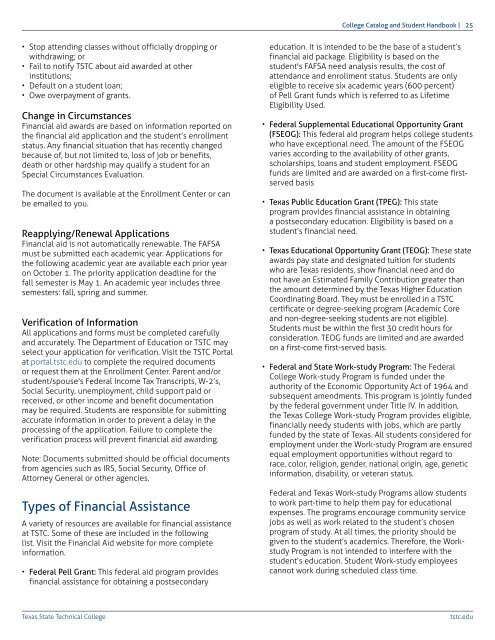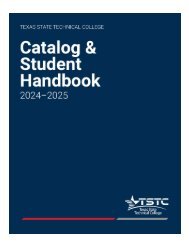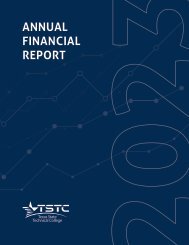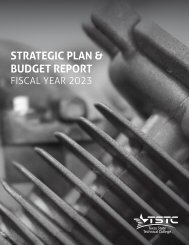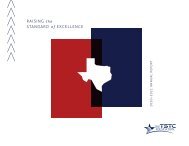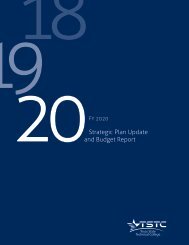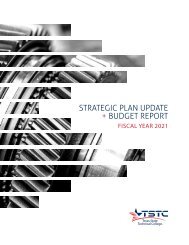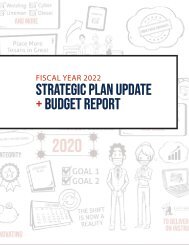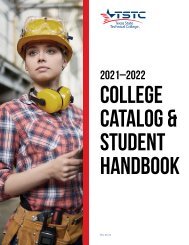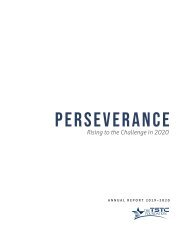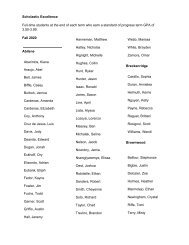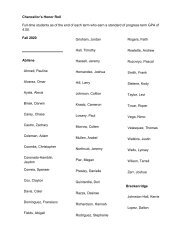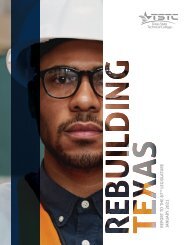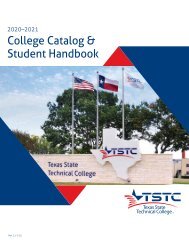Student Handbook and Catalog 2021-22 V2
You also want an ePaper? Increase the reach of your titles
YUMPU automatically turns print PDFs into web optimized ePapers that Google loves.
College <strong>Catalog</strong> <strong>and</strong> <strong>Student</strong> <strong>H<strong>and</strong>book</strong> | 25<br />
• Stop attending classes without officially dropping or<br />
withdrawing; or<br />
• Fail to notify TSTC about aid awarded at other<br />
institutions;<br />
• Default on a student loan;<br />
• Owe overpayment of grants.<br />
Change in Circumstances<br />
Financial aid awards are based on information reported on<br />
the financial aid application <strong>and</strong> the student’s enrollment<br />
status. Any financial situation that has recently changed<br />
because of, but not limited to, loss of job or benefits,<br />
death or other hardship may qualify a student for an<br />
Special Circumstances Evaluation.<br />
The document is available at the Enrollment Center or can<br />
be emailed to you.<br />
Reapplying/Renewal Applications<br />
Financial aid is not automatically renewable. The FAFSA<br />
must be submitted each academic year. Applications for<br />
the following academic year are available each prior year<br />
on October 1. The priority application deadline for the<br />
fall semester is May 1. An academic year includes three<br />
semesters: fall, spring <strong>and</strong> summer.<br />
Verification of Information<br />
All applications <strong>and</strong> forms must be completed carefully<br />
<strong>and</strong> accurately. The Department of Education or TSTC may<br />
select your application for verification. Visit the TSTC Portal<br />
at portal.tstc.edu to complete the required documents<br />
or request them at the Enrollment Center. Parent <strong>and</strong>/or<br />
student/spouse's Federal Income Tax Transcripts, W-2’s,<br />
Social Security, unemployment, child support paid or<br />
received, or other income <strong>and</strong> benefit documentation<br />
may be required. <strong>Student</strong>s are responsible for submitting<br />
accurate information in order to prevent a delay in the<br />
processing of the application. Failure to complete the<br />
verification process will prevent financial aid awarding.<br />
Note: Documents submitted should be official documents<br />
from agencies such as IRS, Social Security, Office of<br />
Attorney General or other agencies.<br />
Types of Financial Assistance<br />
A variety of resources are available for financial assistance<br />
at TSTC. Some of these are included in the following<br />
list. Visit the Financial Aid website for more complete<br />
information.<br />
• Federal Pell Grant: This federal aid program provides<br />
financial assistance for obtaining a postsecondary<br />
education. It is intended to be the base of a student’s<br />
financial aid package. Eligibility is based on the<br />
student's FAFSA need analysis results, the cost of<br />
attendance <strong>and</strong> enrollment status. <strong>Student</strong>s are only<br />
eligible to receive six academic years (600 percent)<br />
of Pell Grant funds which is referred to as Lifetime<br />
Eligibility Used.<br />
• Federal Supplemental Educational Opportunity Grant<br />
(FSEOG): This federal aid program helps college students<br />
who have exceptional need. The amount of the FSEOG<br />
varies according to the availability of other grants,<br />
scholarships, loans <strong>and</strong> student employment. FSEOG<br />
funds are limited <strong>and</strong> are awarded on a first-come firstserved<br />
basis<br />
• Texas Public Education Grant (TPEG): This state<br />
program provides financial assistance in obtaining<br />
a postsecondary education. Eligibility is based on a<br />
student’s financial need.<br />
• Texas Educational Opportunity Grant (TEOG): These state<br />
awards pay state <strong>and</strong> designated tuition for students<br />
who are Texas residents, show financial need <strong>and</strong> do<br />
not have an Estimated Family Contribution greater than<br />
the amount determined by the Texas Higher Education<br />
Coordinating Board. They must be enrolled in a TSTC<br />
certificate or degree-seeking program (Academic Core<br />
<strong>and</strong> non-degree-seeking students are not eligible).<br />
<strong>Student</strong>s must be within the first 30 credit hours for<br />
consideration. TEOG funds are limited <strong>and</strong> are awarded<br />
on a first-come first-served basis.<br />
• Federal <strong>and</strong> State Work-study Program: The Federal<br />
College Work-study Program is funded under the<br />
authority of the Economic Opportunity Act of 1964 <strong>and</strong><br />
subsequent amendments. This program is jointly funded<br />
by the federal government under Title IV. In addition,<br />
the Texas College Work-study Program provides eligible,<br />
financially needy students with jobs, which are partly<br />
funded by the state of Texas. All students considered for<br />
employment under the Work-study Program are ensured<br />
equal employment opportunities without regard to<br />
race, color, religion, gender, national origin, age, genetic<br />
information, disability, or veteran status.<br />
Federal <strong>and</strong> Texas Work-study Programs allow students<br />
to work part-time to help them pay for educational<br />
expenses. The programs encourage community service<br />
jobs as well as work related to the student’s chosen<br />
program of study. At all times, the priority should be<br />
given to the student’s academics. Therefore, the Workstudy<br />
Program is not intended to interfere with the<br />
student’s education. <strong>Student</strong> Work-study employees<br />
cannot work during scheduled class time.<br />
Texas State Technical College<br />
tstc.edu


